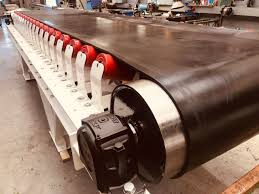
A Belt Conveyor is a widely used mechanical handling system that transports materials from one location to another using a continuous belt loop, powered by pulleys. It's one of the most versatile and efficient systems for moving bulk materials, especially in industries like manufacturing, food processing, logistics, mining, and packaging.
A Belt Conveyor is an essential tool for streamlined material handling, prized for its efficiency, flexibility, and cost-effectiveness. It operates by using a motor-driven belt stretched over rollers or a slider bed, enabling smooth and continuous movement of goods across distances — whether short transfers in a production line or long hauls in warehouses or loading bays.
One of the main advantages of belt conveyors is their ability to transport items of various shapes, sizes, and weights without damaging the product. This makes them ideal for industries like food & beverages, pharmaceuticals, mining, agriculture, logistics, and packaging.
Belt conveyors can handle a wide range of materials, including grains, boxes, powders, aggregates, and food products, depending on the belt type used.
Yes, they can be configured with inclined or declined angles using cleated belts or sidewalls to prevent product slippage during elevation.
The selection depends on your material’s weight, size, temperature, and hygiene requirements. Options include PVC, PU, rubber, and food-grade belts.
Yes. With minimal moving parts, belt conveyors require simple maintenance such as belt alignment, occasional lubrication, and routine cleaning.